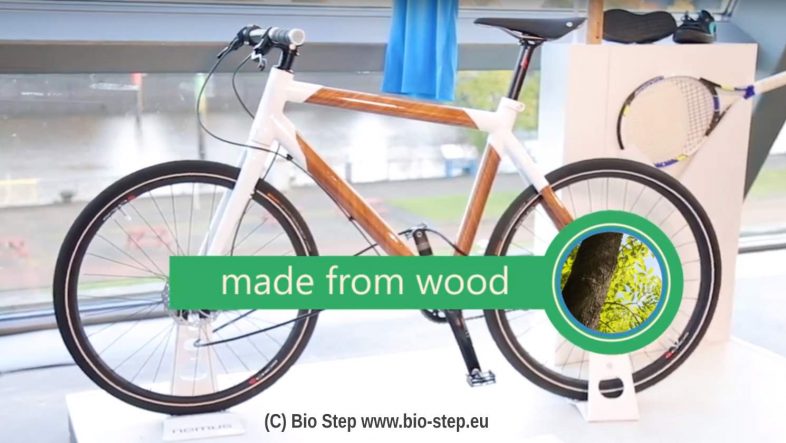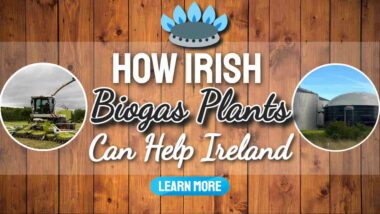The Bioeconomy? What does it mean? That's a good question. Stay with us a moment and we'll explain our definition. Plus, we tell you why a thriving bioeconomy is good for our planet and can reduce climate change.
Our planet is getting more and more crowded. As a result, we need to use our resources more sustainably.
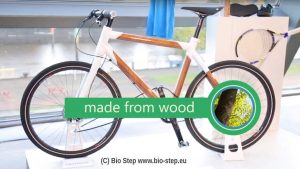
Sustainable, bio-based products already exist thanks to the bioeconomy. But, who really knows what the term bioeconomy means?
The bioeconomy is making and selling useful things using renewable materials which means that these are made from organic, carbon based biological matter, instead of being produced from oil.
The Role of Anaerobic Digestion and Biogas in the Bioeconomy
Anaerobic digestion and biogas are part of it. Biogas (methane) can be essential raw material for making bioplastics for example.
The Move from Oil to Renewable Bioresources
Most things you buy started out being oil and are refined in petroleum refineries to make plastics, and synthetic fibres.

Even though many people are not aware of it, the bio-economy is already part of everyday life.
Bioresource technologies are already being used to replace many goods and processes currently based on fossil fuel resources.
In some cases, bioresource-based goods even have novel properties which make them superior to the goods we currently depend on.
In short, the bioeconomy means using renewable resources for innovative products, instead of the present oil-based economy.
Today, we depend on fossil fuels for things like clothing plastics and chemicals.
In a bioeconomy those products are made from organic biological materials like coffee grounds, spider silk, or compounds produced with the help of microorganisms.
Watch our video below if you prefer viewing a video to reading our text. Don't forget to return and give us your comments after the video finishes!
Note: There is no need to click the link below, as you are on the page referred to in the video already.
“the bioeconomy is a circular economy”
The goal of the bioeconomy is a circular economy producing reusable bio-based products.

Some of the most innovative bio-based products can already be found in our kitchens. Without knowing it, you have quite possibly, already used some of them.
Many nations in Europe are collaborating in EU-wide research to become leaders in this growing market.
However, most people don't realize that sustainable alternatives already exist.
The amazing bio-based innovations which we are now starting to see in our everyday life can only make an impact if we are aware of their benefits and of any possible disadvantages.
Only then can we form our own opinion about the “bio economy”.
The economy is about using renewable resources.
By replacing fossil fuels the bioeconomy has a massive role to play in climate change reduction.
To me, the “bio economy” is about the move away from the petroleum-based way of life. It's about moving to a more sustainable bio-based way of life.
It's about keeping things natural because, unlike oil-based products, bio-based things are usually biodegradable.
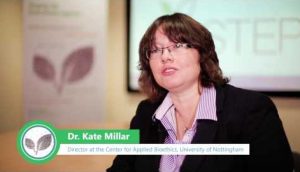 Rather than kill the life of oceans, with an ever larger burden of floating plastic, it means to me the future of our planet.
Rather than kill the life of oceans, with an ever larger burden of floating plastic, it means to me the future of our planet.
Because, if we don't watch what we're doing we won't have a decent planet to live on.
As found on Youtube
What is the Bioeconomy?
Biobased economy, bioeconomy or “biotechonomy” refers to all economic activity derived from scientific and research activity focused on biotechnology. In other words, understanding mechanisms and processes at the genetic and molecular levels and applying this understanding to creating or improving industrial processes.
The term is widely used by regional development agencies, international organizations, biotechnology companies. It is closely linked to the evolution of the biotechnology industry. The ability to study, understand and manipulate genetic material has been possible due to scientific breakthroughs and technological progress. via wikipedia.org
What the EU Says About the Bioeconomy
Agriculture accounts for about 10 % of Union greenhouse gas emissions, and while declining in Europe, global emissions from agriculture alone are still projected to increase up to 20 % by 2030.
A growing global population will need a safe and secure food supply. And climate change will have an impact on primary production systems, such as agriculture, forestry, fisheries and aquaculture.
A transition is needed towards optimal use of renewable biological resources.

To maintain its competitiveness, Europe will need to ensure sufficient supplies of raw materials, energy and industrial products under conditions of decreasing fossil carbon resources – oil and liquid gas production is expected to decrease by about 60 % by 2050.
Bio-waste (estimated at up to 138 million tons per year in the Union, of which up to 40 % is landfilled) has high potential added value as a feedstock for other production processes. Biological resources and ecosystems could be used in a more sustainable, efficient and integrated manner.
Food waste represents another serious concern. An estimated 30 % of all food produced in developed countries is discarded.
Bioeconomy includes primary production – such as agriculture, forestry, fisheries and aquaculture – and industries using / processing biological resources, such as the food and pulp and paper industries and parts of the chemical, biotechnological and energy industries.
In brief, bioeconomy can contribute to building a more competitive, innovative and prosperous Europe.
Under Horizon 2020, the EU identified seven priority challenges where targeted investment in research and innovation can have a real impact. via ec.europa.eu
What the FAO Says About the Bioeconomy
The Food and Agriculture Organisation of the United Nations (FAO) says:
“Its cross-cutting nature offers a unique opportunity to comprehensively address interconnected societal challenges such as food security, fossil-resource dependence, natural resource scarcity and climate change while achieving sustainable economic development.
However, achieving sustainable bioeconomy development faces many challenges:
- these include not only ensuring food security but
- also addressing climate change
- managing natural resources in a sustainable way,
- managing competition between different uses of biomass feedstocks, while
- guaranteeing that bioeconomy development benefits everybody.
It is therefore crucial to establish guidelines that enable it to be developed in a sustainable way. via fao.org
Conclusion – The Transition Won't be Easy!
It became clear during the Industrial Revolution that wood was unsuitable as an energy source for industrial production, particularly iron smelting.
The transition to coal, on the other hand, took decades. Similarly, the transition from coal to oil was neither easy nor quick.
Transitioning to an energy and materials production regime based on renewable resources is also expected to be fraught with technical and political setbacks.
Nevertheless, the bioeconomy is a hot topic for scientists and policymakers.
Rapid advances in molecular biology combined with big data and artificial intelligence have resulted in big jumps in our understanding of living organisms, including the biomass produced by plants and animals, at the level of their DNA.
That has gone hand in hand with technologies that allow scientists and industry to manipulate, easily, everything from enzymes to bacteria to plants and animals.
Industry can now make bio-based plastics from plant oils rather than fossil-based sources. Those bio-based plastics can be made bio-degradable, even in oceans, or they can be made durable, to replace glass. via weforum.org
Technology has advanced, but the political sphere has possibly not done so.
Governments can play a far-reaching role by creating conducive framework conditions for the development of the bioeconomy, as has been pointed out above.
However, governments are themselves subject to a variety of forces, such as lobbying by industry groups and civil society organizations. These may not necessarily be in favour of the bioeconomy.
Bioeconomy policies are, thus, the outcome of conflicting political processes. via springer.com
The recent response to the UK government's recently announced strategy from the UK AD Trade Association ADBA, is the most recent example of this failing, as you can read below:
Anaerobic Digestion Industry Response to Bioeconomy Strategy
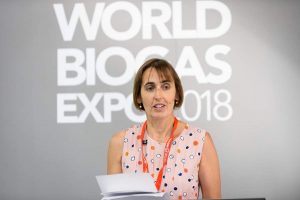
Responding to the government’s ‘Growing The Bioeconomy’ strategy document published today, Charlotte Morton, Chief Executive of the Anaerobic Digestion & Bioresources Association (ADBA), said:
“While it is encouraging to see ministers recognising the huge value that the bioeconomy can deliver to the UK, it’s disappointing that this strategy, which has been two years in the making, contains no new policies or funding that will help to actually achieve the important aims that the strategy sets out.
“The bioeconomy strategy rightly identifies that we need to make better use of unavoidable wastes by converting them into low-carbon, high-value resources – and converting organic wastes into renewable energy and natural fertiliser through anaerobic digestion (AD) is a perfect example of this.
“But it will be impossible for the AD industry to do this to its full potential without concrete action from government to support the separation and processing of these waste feedstocks. One obvious example is inedible food waste: we are still awaiting the long-overdue Resources and Waste Strategy, which – if the government is seriously committed to the bioeconomy – must include a commitment to universal separate food waste collections.
“There’s also much more that government can do for the bioeconomy by supporting on-farm AD (which recycles manure and slurries), restoring financial incentives for generating renewable energy through AD, and establishing a Centre for Anaerobic Biotechnology and Bioresources Research to produce a step-change in AD’s ability to deliver vital bioresources.
“Today’s Bioeconomy Strategy sets out all of the correct principles for creating a thriving UK bioeconomy with AD playing a central role – what we need now is a clear action plan from government to deliver this.”
PR ENDS
Thank you for reading this article. We hope we have helped to raise your awareness of the bioeconomy.
[Article first published 14 January 2019. Updated with video reinstated September 2022.]


